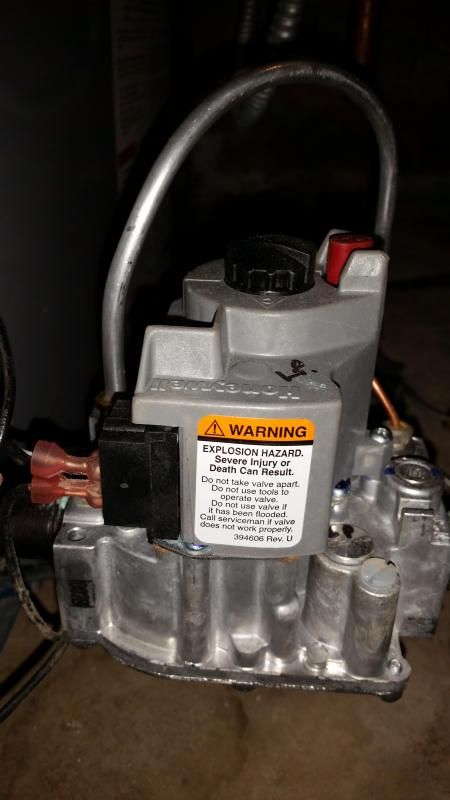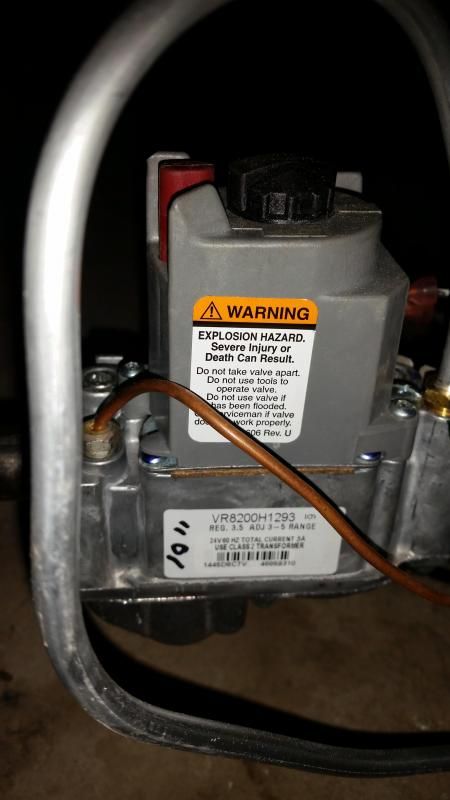Welcome! Here are the website rules, as well as some tips for using this forum.
Need to contact us? Visit https://heatinghelp.com/contact-us/.
Click here to Find a Contractor in your area.
If our community has helped you, please consider making a contribution to support this website. Thanks!
Utica Propane Furnace Delayed Ignition
Options
z0827
Member Posts: 12
in Gas Heating
Hi all,
I have what looks to be a MGB75 LP model. Over the last few months I have been having issues of loud bangs coming from the furnace during initial start up. I immediately called in someone to look at it. Since then, there are times where it is much worse and actually shakes the house. I have seen flames shoot out of the furnace at least 12 inches during start up.
I have had professionals out 5 times now to diagnose my delayed ignition issue. None have been successful. They started by cleaning adjusting the pilot, cleaning everything and even swapping out the regulator on the furnace. The last tech that was out (Thursday) and talked with Utica tech support who suggested to turn up the manifold pressure to 11 W.C. He did that and it seemed to fire OK while he was here. A few hours later, the issue started again. It has been on and off.
Someone had asked if it could be that there wasn't enough oxygen in the basement, so I experimented yesterday but opening a window (covering with a screen) to get some more air in the furnace room, no such luck. It is still happening.
Does anyone else have any ideas that I can have the techs look at? It is getting really, really old, and this really can't keep happening.
Thanks
Zach
I have what looks to be a MGB75 LP model. Over the last few months I have been having issues of loud bangs coming from the furnace during initial start up. I immediately called in someone to look at it. Since then, there are times where it is much worse and actually shakes the house. I have seen flames shoot out of the furnace at least 12 inches during start up.
I have had professionals out 5 times now to diagnose my delayed ignition issue. None have been successful. They started by cleaning adjusting the pilot, cleaning everything and even swapping out the regulator on the furnace. The last tech that was out (Thursday) and talked with Utica tech support who suggested to turn up the manifold pressure to 11 W.C. He did that and it seemed to fire OK while he was here. A few hours later, the issue started again. It has been on and off.
Someone had asked if it could be that there wasn't enough oxygen in the basement, so I experimented yesterday but opening a window (covering with a screen) to get some more air in the furnace room, no such luck. It is still happening.
Does anyone else have any ideas that I can have the techs look at? It is getting really, really old, and this really can't keep happening.
Thanks
Zach
0
Comments
-
Did any of those Professionals that came out 5 times, ever put a Digital Combustion Analyzer on it to see how it is running?
When they raised the pressure to 11" WC, did they do it and run the boiler through its paces to see if there was a pressure drop> Did they turn on all the gas appliances in the house all at once and see what the pressures were on the furnace?
Is the furnace piped with a supply large enough to supply adequate gas pressure when all else is running? To get combustion, you need three things.
Heat
Air/Oxygen
Fuel.
Heat is supplied by ignition/spark. you can't get ignition without a correct air fuel mixture. Too much air, or not enough air will not combust.0 -
To be honest, I am not sure if they put a Digital Combustion Analyzer on it to check that. I Googled to see what that looks like, and I am 90% sure the tech here on Thursday did have one of those hooked up to check the inlet and manifold pressure while it was running and during start up.
We did turn on all of the gas appliances after the pressure was turned up, I was upstairs monitoring the stove top at the time, so I can only assume he tested the pressure then as well.
The piping does seem sufficient. This house has been on propane for about 10 years, but I have only lived here for 1 and haven't had any issues.0 -
He was testing the gas pressure. Not the combustion. If he was doing that properly, he would have used both. You can't use one without the other, properly.
Raising the gas pressure only makes the air fuel ratio change to a richer fuel mixture. Maybe raising it brings to to a proper ratio, maybe not. How would you know without an analyzer.
Its the place to start. Without a combustion analysis, its just a guess. I'm not a LP gas expert. My experience is with oil, Some here are far more experienced than I. But I consider misfiring of LP equipment a Red Zone situation. TDTLW. Too dangerous to live with.0 -
Did this begin before or after someone looked at the boiler?Bob Boan
You can choose to do what you want, but you cannot choose the consequences.0 -
Definitely too dangerous to live with. I have been using my wood stove while I am home, but with my dogs there, I definitely am not comfortable leaving them there with no heat, so it needs to get fixed.
It began before someone looked at the boiler. It was cleaned and serviced before I moved in by the previous owners (December 2013) and it worked great the first year.I had no issues until a few months ago, which is when the first tech came out.0 -
Get a tech with an analyzer.0
-
Did anyone check the draft with a manometer? How were the burners cleaned?
There are about three basic things that come to mind that may cause your problem, assuming no one did anything to it and it worked okay previously:
1. Poor draft, especially as the chimney gets colder (aka "cold stack"). This can be more of an issue with LP because it's heavier than air and cold air from the chimney can cause it to not get into the burner cross over passage to ignite until it has pooled up. When it finally does - KABOOM!
2. The second thing is dirty burners, which can cause the same thing to happen. If the weren't PROPERLY cleaned by washing them in hot water and blowing them out with compressed air, then the problem will persist.
3. Mis-alignment of the burners is the the other. They must be properly aligned and installed level or tipped slightly back towards the manifold or the gas will go to the end, pool up and then ignite - again, KABOOM!
4. Another thing would be the cleanliness of the actual heat exchanger which would also effect draft.
I'm wondering if the problem didn't exist before you bought the place and the cold chimney has caused it to re-appear?
Can you post some pics of the boiler, flue and chimney?Bob Boan
You can choose to do what you want, but you cannot choose the consequences.0 -
I don't think I have seen anyone check it with a manometer. The burners were brushed and blown with compressed air (by the first tech/company) and brushed and blown with nitrogen by the second tech/company.
I guess it could have existed before I purchased the house, but it didn't happen at all when I first moved in (last winter).
Here are some pictures.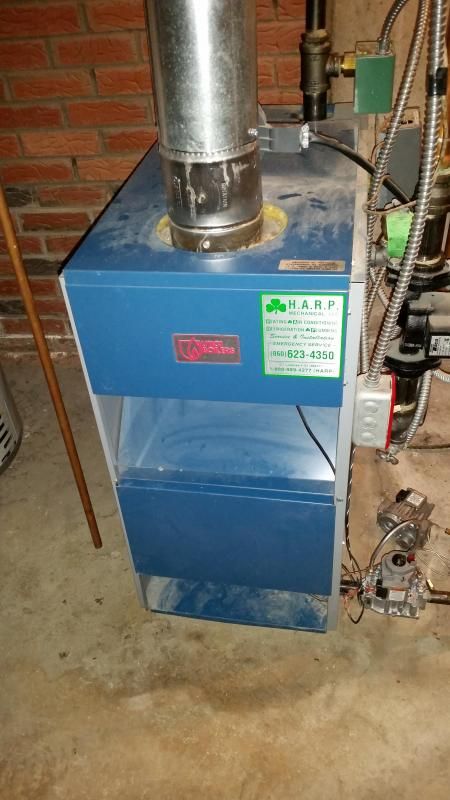
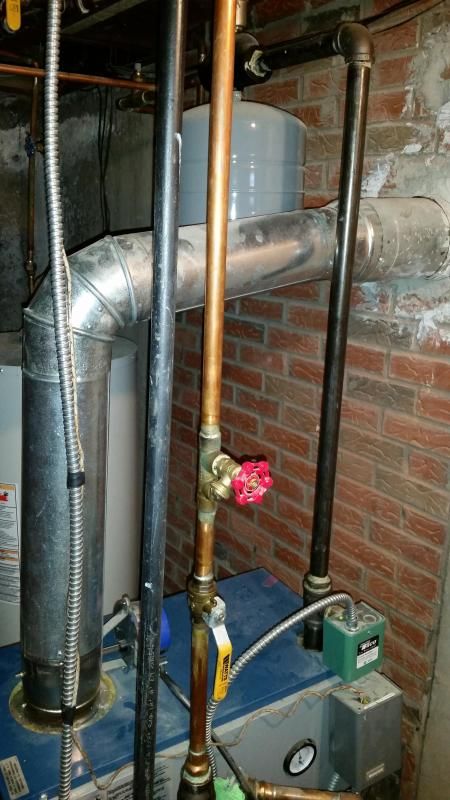
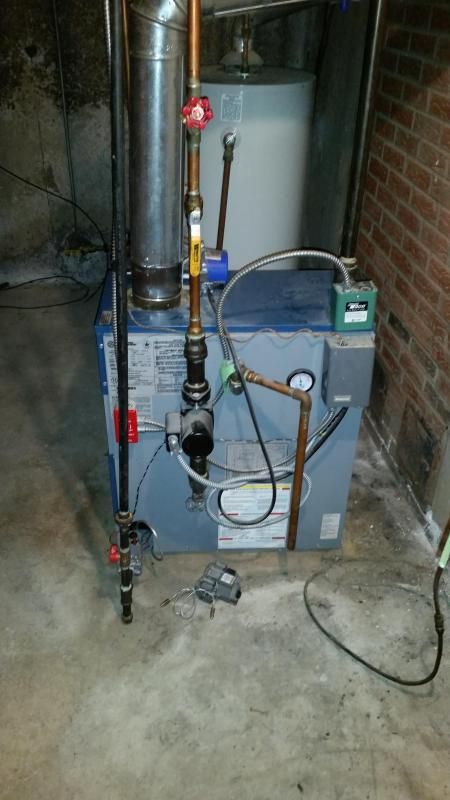
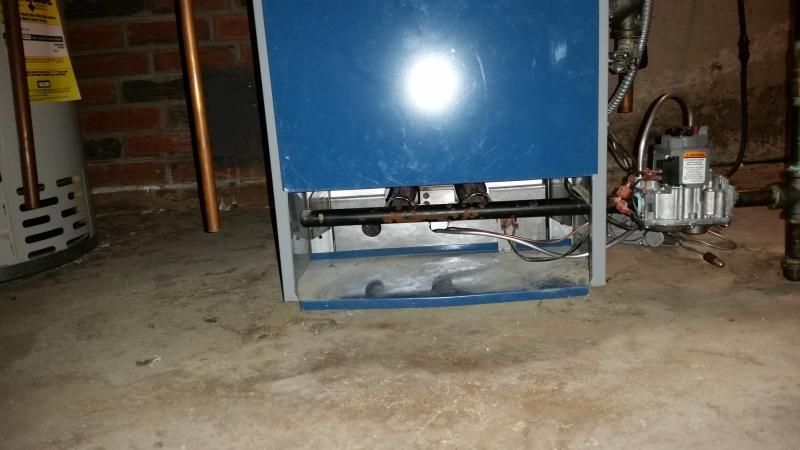 0
0 -
You mentioned the gas valve was replaced. Could you take a pic of the gas valve with the Honeywell numbers on it? It should be something like VR820XXX. I can confirm that the correct valve was installed if provided that number.0
-
The old valve is number vr8200h1137. The new one is vr8200h1293. The person that installed the second one said it was the same, but for natural gas. He then took pieces from the old and put them into the new one so it worked with propane.
To someone that doesn't know much about them, it makes sense, but not sure if that is sketchy or not.0 -
Dis he put a sticker on the new valve saying it was converted to Propane?
Did he leave the instructions in the box for the new valve?
Does it give instructions on how to convert the valve from Nat. Gas to Propane?0 -
-
I'm fairly certain that is the correct valve. I can get confirmation when I get into the office tomorrow morning. I can also provide our nat-lp conversion instructions.
If that checks out, then I am left with 2 possibilities. 1-we need to look at both the static and dynamic gas pressures. If the issue is intermittent, we would want to try to recreate the delayed ignition by cycling it several times. We need to see what the gas pressures are when this event occurs and ensure they are within our specifications.
The second possibility would be a dirty or weak pilot. Is there any history of pilot outages?
My belief is that there is some sort of gas pressure issue.. I see this all the time with LP units. I took a call a couple weeks ago on one of our new boilers that was experiencing noise and burning in the burner tubes. The contractor/lp provider insisted that the pressures were fine and indeed they were. The issue was every time they were testing it, it was working fine. The contractor was ready to rip the boiler out.
We had our rep go out. When they turned the boiler on, it started acting up. Gas pressures were tested and found to be too low. The problem was intermittent.
If you'd like, I can see about getting one of our reps, or our New England field service rep out to take a look at it. Your contractor will need to be on site with us. Please note, only your contractor should be working on the boiler. As always, you or your contractor can call into us at 800 253-7900. You can ask for me if you'd like. I'll be in from 8-5. -Todd1 -
The pilot has never gone out as long as I have lived here. It is definitely intermittent. It doesn't happen all of the time, but more often than not, it isn't lighting correctly.
Thanks for the help. I will give you a call sometime tomorrow and try to figure out a time to get someone over here. That would be great. I really do not want to buy a new boiler at this point in time (and one tech has kind of hinted at that, but I think that is just him trying to avoid troubleshooting it). Thanks again.0 -
What have the outdoor temperatures been in your area? Is the propane tank buried or above ground? Has your LP supplier checked his equipment? In very cold weather the pressure in the tanks drops down and vaporization sometimes is affected. How long is the run of exposed pipe or tubing outdoors? How far away from the propane tanks is the boiler? Is the pipe or tubing to the unit sized correctly (pressure tests will help to show that as a potential problem).
You need to have a combustion analysis done and at the same time check gas pressures and bring all the fans in the house on. Close all the windows and doors and check the draft on the flue and the chimney,
What is that piece of pipe connecting the flue pipe to the boiler? Is that a thermal vent damper?
The valve you have is an "H" which is a slow opening valve and it is convertible to LP. I might suggest replacing the valve with a step opening which will give you a smoother light off.
The folks at ECR are the real pros on all of this and I am sure they know more about all this than any of us here. Get them on site to help you out.0 -
Just a quick update.
Todd was able to walk through some testing with one of the techs (thanks, again Todd). At the end of the call, the hope was that it was a supply issue and the pressure was dropping too much and causing the delayed ignition.
Today the gas company came out and upped the pressure and changed out the regulator on the tank to a larger one. The pressure is great now, even with all of the appliances running full bore.
However, the issue is still happening. It seems that if you have it running constantly, it doesn't happen. But when everything cools down and the boiler kicks on every hour or so to heat the house back up, that is when it fires and is at its worst.0 -
What were the combustion test readings that Todd got?
Has anyone checked draft with that vent damper you could have problems with it not working properly especially when it is cold.
Try having your technician remove the damper and put a piece of flue pipe in its place and see if it makes it any better.
You might want to think about getting a step open gas valve for smoother light off.0 -
I am not sure about the combustion tests. I'm not even sure it was ever done since it never really fired right that day the tech was on the phone with him.
I don't think anyone has ever checked the draft. Maybe that will help. I can try to have someone come over to do that. Is the damper installed for some reason according to the manufacturer, or is it something the installer chooses? I am hesitant to change anything like that only because it has worked fine for quite a while, and now over the last couple months is working terribly.
The tech from the gas company had asked if anyone changed the pilot out, and no one has. He thought that could be an issue as well. Todd asked me to take a video of the pilot, which I did, but not sure what his thoughts were on it. It is almost like the pilot faces too much to the left burner. Is this normal? The tech also mentioned using a "t pilot", but I wasn't sure if that is OK for this type of boiler.
Here is the link. https://www.youtube.com/watch?v=rRm1jsxDT3o 0
https://www.youtube.com/watch?v=rRm1jsxDT3o 0 -
Zach, sorry for the delay. I was very busy today doing a training class. I do think a combustion test is in order, but I wanted pressures within spec before an analysis is performed.
I was just reviewing the pictures you posted here and something caught my eye. In the boiler pics the automatic vent damper is in the open position. Does the vent damper open and close when it goes through a burner cycle?
You have separate companies for your LP provider and service correct? Does your LP provider do service? It seems like quite a hassle to go back and forth.0 -
Hi Todd... No problem at all, I appreciate all of your help.
I honestly didn't even know it was a damper until Tim mentioned it above.
How does the damper work? Is it supposed to stay closed until the boiler is at a certain temperature, and then close? So on start up, it should be closed? Then open?
When I took the pictures, it was cold, and not running at the time, so if what I posted is about how it works, then it probably isn't working correctly. If it was stuck open or not opening/closing properly, could that cause the issue?
And yes, I was using a company separate from the LP provider for service. This was initially because the LP provider couldn't get out here very timely, so I was forced to use another company. The tech that came today for the LP provider seemed to be much more knowledgeable about the boiler, probably because that is what they specialize in.0 -
So something else that I was thinking about that could be related. Around the same time this started happening, I also noticed that the boiler was either not heating as well as it used to or that I was losing too much heat somewhere else in the house.
Now, I don't know much about these things at all, but I feel like it could be related.0 -
Yes, a properly operating vent damper will open on a burner cycle and close on the off cycle. It sounds like yours is held open.(there is a small switch on the damper motor; hold damper open-automatic operation). The purpose of the vent damper it to boost efficiency slightly by closing the vent during the burner off cycle, thus preventing standby losses up the chimney.
It's possible there could be a draft issue because the damper is held open although the boiler should be able to operate normally even if it's held open. At this point we don't know if the damper is functional. A common thing to do is switch it to hold open if the damper malfunctions, as opposed to replacing a part that offers somewhat minimal efficiency gains .
If the damper is indeed open all the time, I'd like to see how it operates if returned to automatic operation and if it has an effect on the delayed ignition symptoms. Give me a call in the morning. I'll be in at 9am0 -
3 more tech visits down, and the issue still exists. If anyone knows a tech that may have an answer and covers the CT area, please let me know.
Next step may be tossing the boiler in the dumpster and going with a new one.0
Categories
- All Categories
- 87.5K THE MAIN WALL
- 3.3K A-C, Heat Pumps & Refrigeration
- 61 Biomass
- 430 Carbon Monoxide Awareness
- 122 Chimneys & Flues
- 2.1K Domestic Hot Water
- 5.9K Gas Heating
- 118 Geothermal
- 170 Indoor-Air Quality
- 3.8K Oil Heating
- 78 Pipe Deterioration
- 1K Plumbing
- 6.6K Radiant Heating
- 395 Solar
- 15.9K Strictly Steam
- 3.5K Thermostats and Controls
- 57 Water Quality
- 51 Industry Classes
- 51 Job Opportunities
- 18 Recall Announcements


